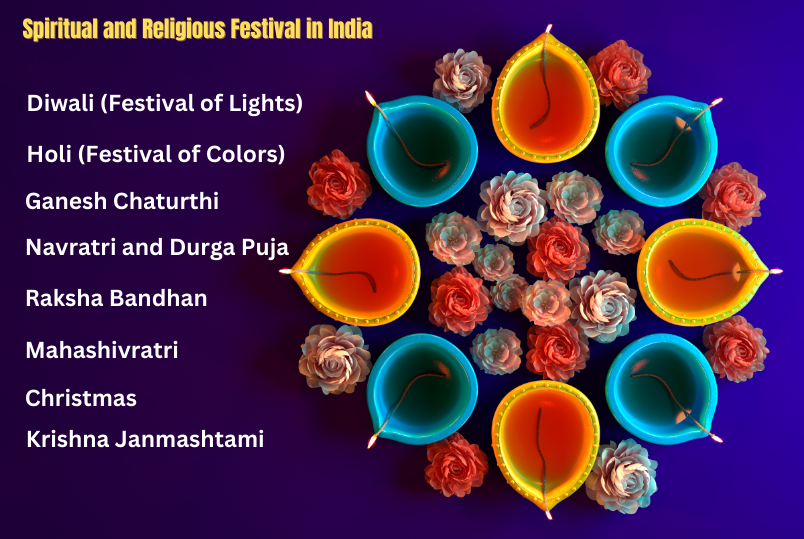India, the land of vibrant cultures and ancient traditions, is also a melting pot of religions and spiritual beliefs. This rich tapestry is beautifully woven with a multitude of festivals, each unique in its customs, rituals, and stories. From grand processions to solemn rituals, every festival in India holds significance and offers a glimpse into the country’s soul-stirring spirituality.
Let’s explore a detailed explanation of spiritual and religious festival events that contribute to India’s diverse cultural heritage.
Diwali (Festival of Lights):
Deepavali, another name for Diwali, is one of the most extensively observed holidays in India. Symbolizing the victory of light over darkness and good over evil, Diwali is marked by dazzling fireworks, the lighting of lamps, and the exchange of sweets and gifts. Celebrated over five days in October or November, houses are adorned with diyas (clay lamps), firecrackers illuminate the night sky, and sweets are exchanged.
Holi (Festival of Colors):
A vibrant display of joy and unity, Holi, the festival of colors, takes place in March. People playfully throw colored powder and water on each other, symbolizing the shedding of inhibitions and the beginning of spring. This lively festival signifies the triumph of good over evil, as well as the arrival of spring, fostering a sense of unity and brotherhood among communities.
Ganesh Chaturthi:
Ganesh Chaturthi, dedicated to the Lord Ganesha, is a significant Hindu festival celebrated with great fervor in Maharashtra and other parts of India. Large idols of Ganesha are installed in homes and pandals, followed by prayers and offerings for ten days. The festival concludes with the immersion of the idols in water bodies, symbolizing the cycle of creation and dissolution.
Navratri and Durga Puja:
Navratri, a nine-night festival dedicated to the divine feminine, is celebrated with fervent devotion in various parts of India. During this period, devotees observe fasts, offer prayers, and perform traditional dances like Garba dandiya and participate in community gatherings. In West Bengal, Durga Puja is celebrated with grandeur, showcasing intricate pandals and majestic idols of Goddess Durga.
Raksha Bandhan:
Raksha Bandhan, is a Hindu festival celebrating the bond between brothers and sisters, On this day, sisters tie a sacred thread (rakhi) on their brother’s wrist, symbolizing their well-being and protection. Brothers, in turn, pledge to protect their sisters and offer gifts as a token of their love. The spirit of the festival extends to cousins, close friends, and even mentors, symbolizing the importance of a protective bond.
Mahashivratri:
Mahashivratri, dedicated to Lord Shiva. Observed in February or March, is a night of fasting and prayers. Devotees fast, visit Shiva temples and perform rituals like jalabhishek (ritual bathing of the Shiva Lingam) to seek blessings for health, wealth, and enlightenment.
Christmas:
Christmas, the birth of Jesus Christ, celebrated on December 25th celebrated by Christians across India with prayers, carols, and festive decorations. Christians attend church services, decorate Christmas trees, and enjoy festive meals with family and friends.
Krishna Janmashtami (Birth of Krishna):
Marking the birth of Lord Krishna, Krishna Janmashtami falls in August or September. Devotees observe fasts, sing devotional songs (bhajans), and perform midnight vigils (Janmashtami Jagran) to commemorate the auspicious moment of Lord Krishna’s birth. Janmashtami is not only a religious festival but also a cultural extravaganza, with vibrant decorations, traditional music and dance performances.
Some Other Religions and spirituals:
- Mahavir Jayanti
- Buddhist Festivals
- Dussehra
- Guru Nanak Jayanti
- Eid-ul-Fitr
- Onam
- Lohri
Khamma Ghani Sa: Elevating Spiritual Experiences
Khamma Ghani Sa is India’s foremost spiritual event organizer, renowned for seamlessly blending tradition with innovation. Celebrating diversity and excellence in execution, they create transformative events that inspire and uplift. With a commitment to community engagement and outreach, Khammaghanissa continues to lead the way in crafting divine experiences for spiritual seekers across India.
In conclusion,
India’s spiritual and religious festivals are more than just celebrations – they are a way of life. Whether it’s the gleaming lights of Diwali, the vibrant colors of Holi or Krishna Janmashtami each festival adds a unique hue to India’s cultural mosaic, making it a truly enchanting land of festivities. These celebrations transcend boundaries, bringing people together in shared reverence, joy, and celebration.


Comments